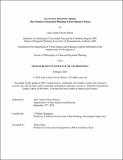Planning Beyond Crisis: The Promise of Insurgent Planning in Post-Disaster Mocoa
Author(s)
Osorio Botero, Juan Camilo
DownloadThesis PDF (17.26Mb)
Advisor
Thompson, J. Phillip
Terms of use
Metadata
Show full item recordAbstract
During the evening of March 31, 2017, a catastrophic landslide engulfed the Colombian city of Mocoa, killing at least 335 people in roughly thirty minutes. Seventy others disappeared, and over one hundred people were reported injured across 48 neighborhoods, and roughly 1,500 housing units were destroyed. With a total of 22,000 people impacted, this catastrophe was the deadliest disaster affecting Colombia in recent decades. Yet, despite an alignment of major national political commitments, international cooperation, and a multi-million-dollar humanitarian budget, reconstruction plans have not been completed seven years later. Why? As the first comprehensive analysis of the landslide and its aftermath, this dissertation is a novel investigation into the competing forces that ultimately canceled the central reconstruction plan, demonstrating that the kind of disruption caused by the disaster mobilized new actors and new forms of agency. In contrast to the popular perception that this kind of lack of remediation suggests the failure of urban governance, the dissertation speaks to the success of activists who have neutralized the government’s reconstruction plan, which activists perceived as worsening the circumstances leading up to both the catastrophe and recovery. Distinguishing between the “landslide” and the “larger disaster,” the dissertation further explains the government’s proposed reconstruction plan within a history of violent extraction, dispossession and displacement. Framing an original case consisting of fifteen planning vignettes to trace actions, reactions and counteractions, I expose the reduction of the planning process as crisis urbanism. My research contributes to our understanding of variability among insurgent planning actors and their invented spaces for engagement in the context of disaster, by defining technocratic resistance as a valid form of dissent inside the government, and by proposing a new device for the study of insurgent planning called transformative spaces enabling local community’s right to plan. Drawing on contemporary debates on anti-crisis, risk and decolonial thought, the dissertation imagines an alternative paradigm for planning beyond crisis that enables radical community action through dissenting grassroots leadership.
Keywords: crisis urbanism, technocratic resistance, insurgent planning, regenerative planning, anti-crisis, risk, decolonial thought
Date issued
2025-02Department
Massachusetts Institute of Technology. Department of Urban Studies and PlanningPublisher
Massachusetts Institute of Technology